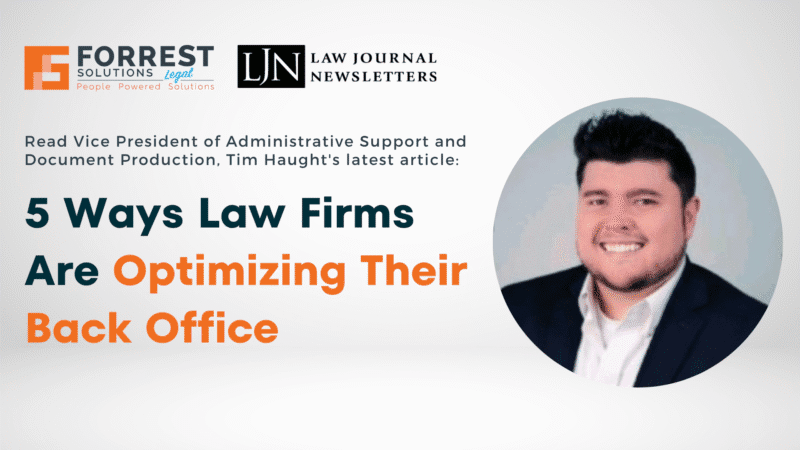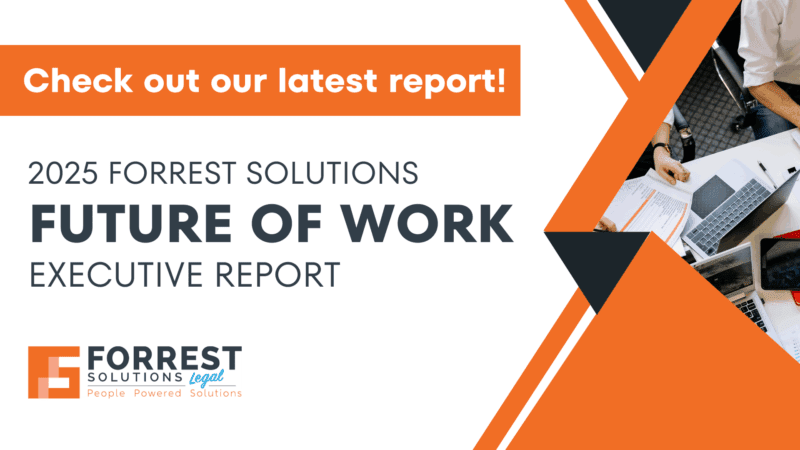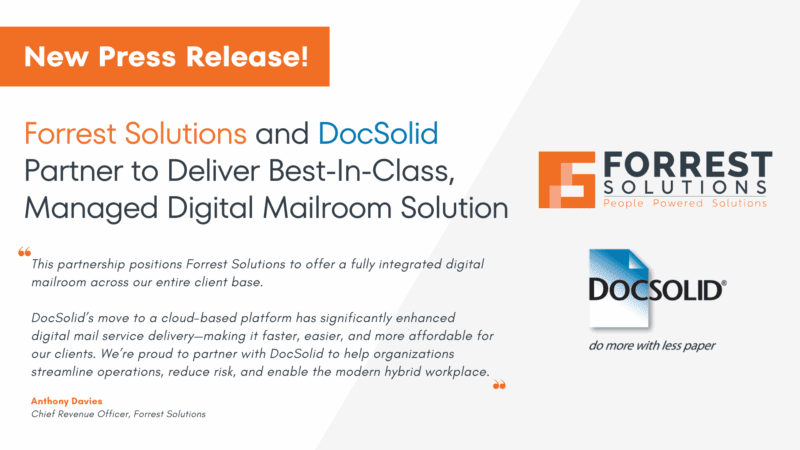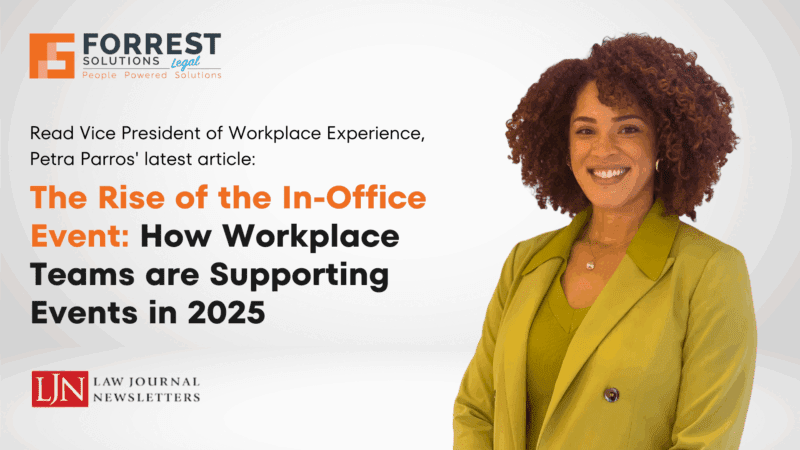
This article originally appeared in ALM’s Law Journal Newsletters April 1, 2025, here.
In 2021, predictions about the future of the workplace were shaped by the disruptions caused by the global pandemic. The legal industry, known for its traditional and formal culture, was no exception. At that time, my earlier article, “The Rise of Hospitality in Law Firms,” explored the early stages of how law firms were beginning to recognize the value of hospitality and services as a key component of their business model.
Fast forward to today, and we are witnessing the continued evolution of this trend, as firms embrace a more holistic approach to employee experience, client relations, and workplace design. In this follow-up, we’ll look at how hospitality-focused services have further developed in law firms, the importance of this shift, and where the industry is heading in the near future.
The Evolution of the Workplace: Predictions and Reality
In 2021, industry experts predicted a radical transformation in how workspaces would look, feel, and operate. The future of work was expected to be more flexible, with hybrid work models offering a balance between in-office collaboration and remote productivity. Law firms, traditionally rooted in the “office-centric” culture, were expected to struggle with this shift. Yet, many have found opportunities in this change, especially when it comes to the integration of hospitality-inspired services into their spaces.
At the heart of this evolution was the understanding that lawyers, like all employees, needed more than just a desk and a chair. They required an environment that supported not just their professional lives, but their overall well-being. Law firms realized that embracing hospitality in the workplace could foster an environment of greater collaboration, satisfaction, and productivity. As firms reimagined their office environments, the focus shifted toward creating spaces that feel less like traditional offices and more like welcoming, service-oriented environments—ones that prioritize comfort, flexibility, and innovation.
The Importance of Hospitality-Focused Services and Experiences
The concept of hospitality is about more than just offering a good cup of coffee. It’s about curating experiences and services that make individuals feel cared for, valued, and supported. In the case of law firms, hospitality is particularly essential as it impacts not just internal employees but also clients. A well-designed, hospitality-driven environment conveys a message of professionalism, care, and attention to detail, which is key in the legal profession where trust is paramount.
Hospitality services in law firms can range from concierge-style services to enhanced office amenities such as health-focused spaces, lounges, and even wellness programs. For instance, we are now seeing law firms integrate wellness rooms, gyms, and on-site cafeterias that cater to healthy eating habits. Some firms have even started offering flexible workspaces with adjustable desks, collaboration zones, and quiet areas for focused work.
Moreover, the demand for client-facing hospitality experiences has intensified. Law firms are incorporating more client-centric services, such as personalized spaces for client meetings, high-end catering, and concierge-style offerings during in-person visits. This shift is particularly notable in larger firms, where client interaction is an essential part of the business model, and the expectation is that the firm offers more than just legal expertise—but an experience that reflects the quality and commitment to excellence that clients expect.
The WPX Training Program: A Benchmark for Professional Services
To successfully execute the hospitality-driven workplace transformation, law firms must ensure their teams are adequately trained in delivering these new services and experiences. This is where programs like the WPX Training Program, developed by Forrest Solutions, become crucial. This program serves as a benchmark for the professional services industry, equipping staff with the tools and mindset to create exceptional workplace experiences.
WPX training focuses on creating a service-oriented culture that blends high-touch hospitality with professionalism. Staff members learn how to provide seamless, anticipatory service that enhances the workplace environment and fosters client satisfaction. As law firms move toward embracing more hospitality-driven models, equipping staff with these essential skills ensures that the shift is not only seamless but also sustainable in the long term.
The Future of Law Firm Workplaces: Predictions Ahead
Looking forward, the future of law firm workplaces will be defined by an even greater emphasis on employee and client experiences. Predictions point to more advanced integrations of technology to streamline services, such as AI-driven concierge systems, as well as continued investments in wellness and work-life balance initiatives. Hybrid work models will likely remain in place, but the office will continue to hold significant value for law firms, serving as the heart of collaboration, client meetings, and team cohesion.
The office may not be the default environment for everyday work, but it will remain integral for high-stakes projects, client consultations, and fostering the culture that distinguishes leading firms. Recent data supports this notion. A survey conducted in late 2023 revealed that 74% of law firms reported a hybrid working model, but 64% emphasized the importance of the office for collaborative work and client-facing functions. These numbers indicate that while remote work is an attractive option for flexibility, the office remains central to a law firm’s operations.
One of the most exciting examples of this shift in workplace design can be found in the new JP Morgan building in New York City. The building features a number of high-end amenities and services that are quickly becoming a template for law firms to follow.
The 2.5-million-square-foot space includes an impressive wellness center, rooftop gardens, an in-house cafeteria with various dietary offerings, and even a music room for relaxation. These features elevate the traditional office experience, creating a space that’s not only functional but also caters to the mental and physical well-being of its employees. Law firms are following suit, increasingly designing spaces that blend productivity with wellness, allowing lawyers and staff to perform at their highest level while ensuring their well-being is a priority.
Conclusion
The rise of hospitality in law firms is not just a passing trend but rather a strategic shift that is here to stay. As we look ahead, the integration of service-oriented experiences in law firms will continue to play a key role in the evolution of the workplace. With programs like WPX Training providing the tools for creating high-end, client-focused services, and forward-thinking office designs like those seen in JP Morgan’s new headquarters offering a model for the future, the legal industry is on the cusp of a new era.
As the workplace continues to evolve, one thing is clear: law firms that embrace a hospitality-driven approach will not only attract top talent but will also foster long-term client relationships, ensuring they remain competitive in an increasingly demanding and service-oriented world. The office may look different in the future, but it will remain a central hub for collaboration, creativity, and client engagement. The rise of hospitality in law firms is just the beginning of a much broader transformation in the legal industry.





